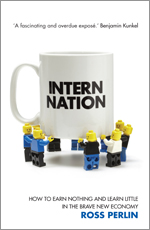My name is Karlee Weinmann, and I am an intern.
There it is, the dreaded I-word, with its modern connotation of a young person exploited, underpaid and somehow still out of luck when trying to transition to a full-time job. Let me be up front: I enjoy what I consider a productive and meaningful internship experience at The Fiscal Times, and it happens to be paid – a rarity in the ever-competitive internship market. I found a highly critical, first-of-its-kind examination of internship culture, Intern Nation: How to Earn Nothing and Earn Little in the Brave New Economy by Ross Perlin (Verso, $22.95), particularly interesting: Finally, I thought, here is a deep dive into this vicious cycle that’s become a fact of life not only for me, but for my entire generation.
Perlin’s findings will be of unique interest to interns themselves – how they have very limited rights in the workplace, that requiring school credit for internships is a huge financial boon to colleges – and several times while reading, I marveled at the book’s resonance. But the author’s extensive tie-ins to general labor rights, business practices and globalism are of wider appeal. At times, his go-to examples of interns tasked with doing household chores for their bosses or flipping burgers under the guise of management experience feel over-wrought and extreme, yet his general message is one rarely delivered: Interns are workers, too, and deserving of compensation and rights.
Starting with the internship’s antiquated beginning as an apprenticeship centuries ago, Perlin, a former Time writer and also a former intern (of course), traces the trajectory of the position all the way to today’s troubling landscape, in which money-minded employers capitalize on the flood of young people seeking opportunities to bolster their resumes. High school and college students are taught, he says, that internships are a necessary stepping stone to a stable, decently paid job. And because this notion has been so ingrained in a generation’s collective consciousness, employers can easily fill unpaid slots for full-time interns. While many of these internships are exhausting to the lucky few selected from what is often a huge applicant pool, they are also, in large measure, patently illegal. 
And on that point: Though the book relies heavily on personal anecdotes and frequently acknowledges a dearth of meaningful scholarly research on the topic, the focus on legal rights is probably the most useful part of the book. “Internships are changing the nature of work and education in America and beyond. Over the last few decades, they have become the principal point of entry for young people into the white-collar world. A significant number of these situations are unethical and even illegal under U.S. law – a form of mass exploitation hidden in plain sight,” Perlin writes.
Perlin provides a detailed analysis of relevant case law that dictates whether an internship is justly unpaid. Turns out, it’s a tough standard to meet. According to the criteria Perlin presents – which notably include that an employer “derives no immediate advantage” from the intern – the vast majority of unpaid opportunities are not above-board. If interns ease the operations of an organization, paid employees are displaced because of interns taking over duties or employers directly benefitting from interns’ work. According to a court decision cited by Perlin, interns are entitled to at least minimum wage.
Most interns weigh the usually grueling, thankless job experience against the pot of gold at the end of that proverbial rainbow: a letter of recommendation and a resume item, which today are fought for and won like badges of honor. But what happens when something goes wrong on the job? What happens if an intern gets hurt or sexually harassed? The courts have repeatedly upheld that unpaid interns don’t have the rights that paid employees do, Perlin shows. In fact, because they lack the fundamental characteristics of a traditional worker – a paycheck, benefits, and sick pay – they scarcely have any rights at all.
Perlin’s book also presents the commoditization of the modern-day internship. Internship brokers dangle unpaid positions at coveted corporations for a price tag in the thousands. Outfits like these, and the obvious tendency for well-heeled prospective interns to take on unpaid work over their less affluent counterparts, have Perlin concerned about a lack of workplace diversity. When we’re all told that “it’s not what you know, but who you know,” the out-of-reach networking opportunities can be equally devastating both to the individual and to future workplaces.
It’s clear throughout that Perlin is on a crusade for reform. He calls on interns to organize and advocate for their rights and others to help spread the word. He also includes an “Intern Bill of Rights,” which he says should be proposed in Congress. While he presents a compelling case, it’s important of course to note that not everyone falls through the cracks. While thousands of interns don’t have a positive story to tell – and I know dozens of them – others have also been either diligent or lucky enough to land several healthy internships. I put myself in this latter category. So they’re out there. They do exist.
Intern Nation is a thought-provoking and worthwhile read if you balance its hard truths with weighty accusations leveled in personal stories. You shouldn’t come away from the book thinking internships are a cancer to our workforce. They’re not. The problem lies in the corporate lure of capitalizing on eager young people, desperate for experience – and pay, if and when they can get it.
Related links:
Intern Nation by Ross Perlin – review (The Guardian)
Intern Nation: Overdue and Under-Delivered (Business Insider)
Molly Fischer Reviews Ross Perlin’s “Intern Nation” (The New Republic)




